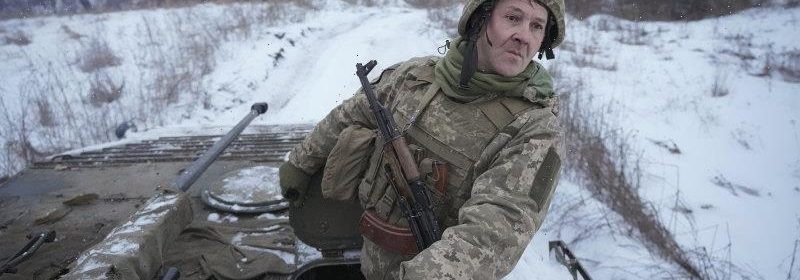Ukrainian ambassador forced to walk back claims nation could drop NATO bid

Ukraine could drop its bid to join NATO to avoid war with Russia, the BBC quoted the country’s ambassador to Britain as saying, in what would amount to a major concession to Moscow in response to the build-up of Russian troops on its borders.
However, the ambassador walked back his remarks in a later interview as President Volodymyr Zelenskiy’s spokesman insisted that aspirations to join NATO and the European Union remain the absolute priority to the country.
Ambassador Vadym Prystaiko told the BBC on Monday morning local time that Ukraine was willing to be “flexible” over its goal to join the Atlantic military alliance, a move Russian President Vladimir Putin has said would be a trigger for war.
“We might – especially being threatened like that, blackmailed by that, and pushed to it,” Prystaiko, Ukraine’s foreign minister until 2020, was quoted as saying when asked if Kyiv could change its position on NATO membership.
Ukraine’s ambassador to Britain, Vadym Prystaiko, pictured left meeting former US Secretary of State Mike Pompeo in January 2020, was Ukraine’s foreign minister until the middle of 2020. Credit:Reuters Pool
Shortly after his remarks made headlines around the world, Prystaiko returned to the BBC to state that the former Soviet republic would not be reconsidering its attempt to join the military alliance, after a spokesman for the Ukrainian President said the ambassador needed to clarify what he meant.
This course is not only reflected in the Constitution, but is also the full consent of the authorities and society,” spokesman Sergii Nykyforov told Reuters. “Mr Ambassador used the word ‘flexibility’. I think it’s worth giving him the opportunity to explain what exactly he had in mind.”
This interview came as the current Ukrainian foreign minister Dmytro Kuleba said his nation was seeking an explanation from Russia within the next 48 hours about the build-up of troops on the borders.
A convergence of events over the coming week could determine whether the stalemate is resolved peacefully or Europe is at war. At stake are Europe’s post-Cold War security architecture and long-agreed limits on the deployment of conventional military and nuclear forces there.
“This next 10 days or so will be critical,” said Ian Kelly, a retired career diplomat and former US ambassador to Georgia who now teaches international relations at Northwestern University.
Ukraine is not a NATO member but has a promise dating from 2008 that it will eventually be given the opportunity to join, a step that would bring the US-led alliance to Russia’s border.
Putin has been arguing that Ukraine’s growing ties with the alliance could make it a launch pad for NATO missiles targeted at Russia. He has said Russia needs to lay down “red lines” to prevent that.
Russia has moved more than 130,000 troops and heavy weapons to within striking distance of Ukraine in recent weeks, prompting the United States and its NATO allies to warn that an invasion could be imminent.
Moscow denies it is planning an attack, calling the military manoeuvres exercises, but it has issued written demands that NATO forgo any further expansion eastwards including Ukraine. NATO members have rejected the demand.
US President Joe Biden spoke to his Ukrainian counterpart Volodymyr Zelensky on Sunday and agreed to continue diplomatic efforts to try to resolve the crisis, the White House said.
German Chancellor Olaf Scholz, on the eve of a trip that takes him to Kyiv and then to Moscow for talks with President Vladimir Putin on Tuesday (Wednesday AEDT), called for Russia to de-escalate and warned of sanctions if Moscow did invade.
A German official said Berlin did not expect “concrete results” but diplomacy was important.
In the week ahead, Washington and NATO are expecting Moscow’s formal response after they rejected its main security demands, and major Russian military drills in Belarus, conducted as part of a deployment near Ukraine, are supposed to end. The fate of the Russian troops now in Belarus will be key to judging the Kremlin’s intentions.
“This next 10 days or so will be critical.”
At the same time, the Winter Olympics in China, often cited as a potential deterrent to immediate Russian action, will conclude on Sunday, February 20. Although US officials have said they believe an invasion could take place before then, the date is still considered important.
In Washington, President Joe Biden’s National Security Adviser Jake Sullivan said an invasion could begin “any day now”.
“We cannot perfectly predict the day, but we have now been saying for some time that we are in the window,” Sullivan told CNN.
US officials said they could not confirm reports that US intelligence indicated Russia planned to invade on Wednesday.
Sullivan said Washington would continue sharing what it learned with the world in order to deny Moscow the chance to stage a surprise “false flag” operation that could be a pretext for an attack.
It would also “defend every inch of NATO territory … and Russia we think fully understands that message,” Sullivan added in a separate CBS interview.
Reuters, AP
Most Viewed in World
From our partners
Source: Read Full Article

